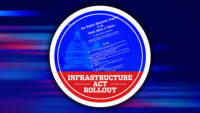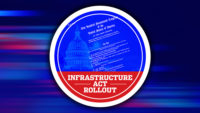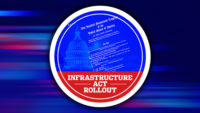The U.S. Dept. of Transportation has opened a competition for another stream of Infrastructure Investment and Jobs Act funds, this one aimed at helping to carry out President Biden’s plan to build a nationwide network of electric vehicle charging stations by 2030.
DOT’s Federal Highway Administration on March 14 announced that it now will begin to accept applications for $700 million in IIJA Charging and Fueling Infrastructure Program grants.
The program totals $2.5 billion over five years; the initial $700 million includes $300 million from fiscal year 2022 funds and $400 million in fiscal 2023 dollars.
The deadline for applications is May 30. View FHWA Notice of Funding Opportunity here. Eligible applicants include states, cities, counties, public colleges and universities and Native American tribal governments.
The IIJA splits the Charging and Fueling Infrastructure Program into two categories—community and corridor—allocating $1.25 billion to each.
Community grants are for deploying EV charging infrastructure along public roads or other publicly accessible sites, such as parking lots at public buildings, public schools and public parks. The corridor program is for charging infrastructure along “alternative fuel corridors."
An administration official said in a March 13 press briefing to preview the announcement that DOT’s goal is have “at least 40% of the benefits flow to disadvantaged communities, particularly rural and tribal."
Another official said that the Charging and Fueling grant program “is a crucial piece of the puzzle to build the national EV charging network.”
Those new grants complement the IIJA's even-larger $5 billion in National Electric Vehicle Infrastructure formula grants. They are distributed by a formula to states, Puerto Rico and the District of Columbia, and are for charging infrastructure located along Interstate highways, and other federal and state arterials.
The new discretionary grants go to a wider range of applicant types and are aimed at filling gaps in the other networks and addressing EV needs in urban and rural communities, downtowns and neighborhoods.






Post a comment to this article
Report Abusive Comment